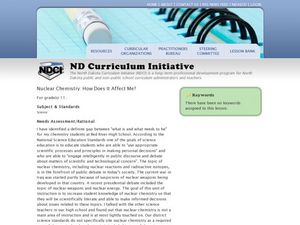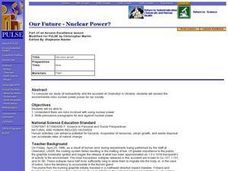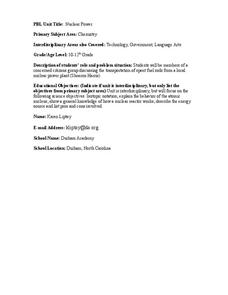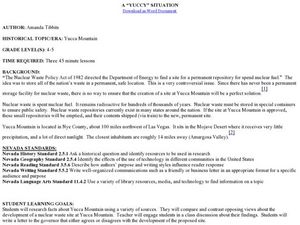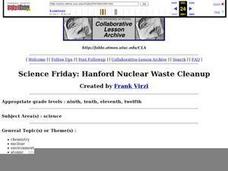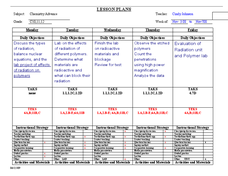Curated OER
Radioactive Decay: A Sweet Simulation of a Half-life
High schoolers demonstrate rates of decay of unstable nuclei can be measured. They understand ratios and multiplication of fractions. They simulate radioactive decay. They read about the accomplishments of scientists.
Curated OER
Radioactivity Experiments
Students study the difference between types of ionizing radiation and how elements are transmuted. They determine that radiation is normal and surrounds us. They calculate the amounts of alpha, beta and gamma radiation emitted from a...
Curated OER
Atomic Candy
Mmmmm! Radioactive "candium!" Nuclear physics or chemistry classes use M&M'S® to demonstrate the process of radioactive decay. Individuals pour out a bag of candies and record the number that fall M-side-up to represent the number of...
Virginia Department of Education
Determining Absolute Age
How can radioactive decay help date old objects? Learners explore half-life and radioactive decay by conducting an experiment using pennies to represent atoms. Young scientists graph data from the experiment to identify radioactive decay...
Curated OER
Energy: Nuclear Power
For this energy and nuclear power worksheet, students, with a partner, discuss what thirteen energy terms mean and match those same terms to their definitions in the second activity.
Curated OER
Nuclear Chemistry Homework Problem Set
In this nuclear chemistry worksheet, students evaluate data from concentration experiments on radioactive iodine. They graph the data, determine radioactive decay and half life for the element.
Curated OER
Nuclear Chemistry
In this nuclear chemistry worksheet, students solve nine decay problems. They determine what forms in each problem given the radioactive element.
Curated OER
Radioactive Decay
Learners explore radioactive decay. Through various activities, students examine methods for permanent disposal of radioactive waste. After performing a random process experiment, learners compare the results to radioactive decay. ...
Curated OER
Nuclear Chemistry: How Does It Affect Me?
Eleventh graders study the different areas of nuclear chemistry. In this energy and critical thinking instructional activity students study radiation, nuclear energy and weapons then divide into groups and create a poster.
Curated OER
Our Future - Nuclear Power?
Students comprehend that there are risks involved with using nuclear power. They write persuasive paragraphs for and against nuclear power. Students analyze the environmental issues and risks with nuclear power.
Curated OER
Chemistry 115 Practice Exam 3
Radioactive decay, pH, properties of elements, organic compounds, and stoichiometry are all touched upon through this practice chemistry exam. It always helps learners to take a practice test in preparation for the actual exam. This...
It's About Time
What Determines and Limits an Atom's Mass?
Provide learners with the tools to further understand nuclear energy and isotopes. Young chemists investigate the components of an atom's nucleus, use symbols to represent various isotope forms, and use the percent abundance of an atom's...
CK-12 Foundation
Radiocarbon Dating
How do we know how long ago a dinosaur lived or an ancient fire pit was used? Scholars learn about the application of carbon dating and half lives to discover things about the past. They adjust the amount of radioactive carbon in the...
Curated OER
Effects and Applications of Nuclear Chemistry
In this nuclear chemistry instructional activity, students determine the biological effects and the applications of nuclear chemistry. Then students use Einstein's theory of special relativity to complete 3 problems.
Texas State Energy Conservation Office
Investigation: Splitting Atoms
In a simple activity, physical scientists model nuclear fission using a droplet of oil. This can be used alone in a unit on different types of energy, or as part of the energy conservation unit produced by the Texas State Energy...
Curated OER
Half-life Worksheet
In this half-life worksheet, students determine how long it takes for a 100g sample of AU-198 to decay to 6.25g. Then they determine the half-life of a radioactive isotope if a 500.0g sample decays to 62.5g in 24.3 hours. Students also...
Curated OER
Nuclear Power
Students take on the role of members of a concerned citizens group and discuss the transportation of spent-fuel rods from a local nuclear power plant and the safety issues that surround the power plant. Students work in groups to write...
Curated OER
Radioactivity
In this radioactivity worksheet, students write the mass number and atomic number for the missing element in the reactions. Students identify the isotope that is more stable and determine the half-life of the isotope. This worksheet has...
Curated OER
A Yuccy Situation
Students examine the concept of nuclear waste storage. In this interdisciplinary lesson, students research Yucca Mountain in order to compare and contrast opposing views regarding the nuclear waste site there. Students compose a letter...
Curated OER
Half Lives
Students investigate the concept of half-life by conducting an M&M experiment. In this chemistry lesson, students differentiate nuclear fusion and fission. They present investigation findings to class.
Curated OER
Radioactive Isotopes
Students describe an isotope and radioactive isotope in a written essay. They describe how a specific country or region was affected by radioactive contamination and attempt to sympathize with those affected by these radioactive...
Curated OER
Nuclear Decay
In this nuclear decay worksheet, students read about alpha and beta decay and the isotopes formed by the reactions. Students solve nine problems including writing the equations for the decay of radioactive isotopes, identifying the...
Curated OER
Science Friday: Hanford Nuclear Waste Cleanup
Students practice careful listening skills to learn about problems regarding cleanup of radioactive wastes at the Hanford nuclear reservation in Washington State. Students answer the questions imbedded in the lesson as they listen to the...
Curated OER
Nuclear Chemistry
Students write and balance nuclear equations. In this chemistry lesson, students identify materials that block radiation using polymers. They collect and analyze data from the experiment.










